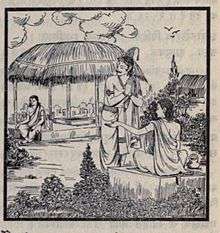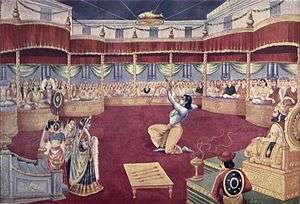Drupada
Drupada (Sanskrit: द्रुपद, lit. firm-footed or pillar[1]), also known as Yagnasena (Sanskrit: यज्ञसेन, lit. father of Draupadi), is a character in the Mahābhārata. The son of King Prishata, he was the king of the land of Southern Panchala.[2] His capital was known as Kampilya.[3]
| Drupada | |
|---|---|
| Mahabharata character | |
 Upyaz showing his elder brother to Drupada | |
| In-universe information | |
| Family | Prishata (father) and Vishakha (mother) |
| Spouse | Kokila Devi |
| Children | Shikhandi Satyajit Dhrishtadyumna Draupadi |
Conflict with Drona
Drupada, son of King Prishata, and Drona study together under the tutelage of Rishi Bhardwaja, Drona's father. They become great friends and Drupada assures Drona that once he becomes king, he will share half of his kingdom with Drona. While Drupada becomes a king after the death of his father, Drona lives a life of poverty. Drona approaches Drupada for help; Drupada, now conscious of the difference of status between them, refuses to acknowledge Drona's friendship and shuns Drona, calling him a beggar. Drona is later employed by Bhishma to train the Kuru princes. After the military education of the Kauravas and the Pandavas ends, as his gurudakshina, Drona asks the princes to defeat and capture Drupada. Firstly, all the Kauravas, along with Karna, attack Drupada, but Drupada defeats all the Kauravas and Karna.[4] Then the Pandavas led by Arjuna defeat Drupada, binding him in ropes and bringing him to Drona. Drona sets Drupada free, but retains half of the kingdom that had been promised to him. Humiliated, Drupada seeks vengeance but he realizes that he cannot match Drona's might. So, Drupada performed the Putrakameshti yajna to beget a son who could slay Drona. From the fire of the yajna, twins Dhrishtadyumna and Draupadi are born. Years later, Draupadi married Arjuna and later in the Mahabharata war, Dhrishtadyumna beheaded Drona.[5][6]
Svayamvara of Draupadi

King Drupada arranges a svayamvara for his daughter Draupadi. To win Draupadi's hand, the king's invitees, all of them royalty themselves, have to string an enormous bow and shoot five arrows simultaneously through a revolving ring onto the eye of a revolving fish. All the kings including Shalya and Karna fail to even string the bow.[7] The five sons of the late King Pandu of Hastinapur are present at the Svayamvara, dressed as brahmins. Arjuna succeeds in the event and Draupadi accepts him as her husband, with Drupada somewhat reluctantly giving his permission. When Draupadi is taken back to Kunti, they decide to play a prank on her by announcing that they had brought some alms. Kunti asks her sons to share whatever had been brought. The imperative of acting on their mother's words and the propriety of marriage to five husbands is discussed at Drupada's palace, with Drupada and Dhristadyumna fiercely opposed to Draupadi marrying anyone other than Arjuna. However, sage Vyasa and Lord Krishna supports Kunti's proposal and sanctions the marriage, assuaging Drupada's fears.[8]
Family
Different versions of the Mahabharata portray Drupada's family differently. Most versions name Satyajit, Dhristadyumna, Shikhandi (or Shikhandini), and Draupadi as his children. Uttamaujas and Yudhamanyu are often mentioned as two sons of Drupada who are the protectors of Arjuna's chariot. The Chatahurduri compilation mentions that Drupada has twelve sons, naming in addition to the aforementioned children: Kumar, Vrika, Panchalya, Suratha, Shatrunjaya.[9] Janmejaya is the nephew of Drupada, and father-in-law of Prativindhya. Notably, Satyajit's eventually ascends to Panchal's throne having eschewed the Kurukshetra War (some versions have Satyajit fighting and dying in the war with Prativindhya's or Sutasoma's son ascending the throne), Shikhandi was instrumental in the death of Bhishma, and Uttamaujas and Yudhamanyu protected Arjuna's chariot throughout the war. Dhrishtadyumna, Shikandi, Yudhamanyu, and Uttamaujas are killed by Ashwatthama on the last day of the war.[9]
Role in Kurukshetra War
Drupada fights on the side of the Pandavas in the Kurukshetra War. He killed Shakuni's brothers-in-law Keturaja and Ketusena of Kosala on 11th day of war. Bhishma names him a maharathi.[10] He along with Virata fought and were killed by Drona on the 15th day of the war.[11]
References
- "Sanskrit Dictionary for Spoken Sanskrit". spokensanskrit.de. Archived from the original on 15 October 2014. Retrieved 20 May 2015.
- "The Mahabharata, Book 1: Adi Parva: Sambhava Parva: Section CXXXI". sacred-texts.com. Retrieved 20 May 2015.
- "Mahabharat - Draupadi'S Swayamvar". urday.in. Archived from the original on 10 March 2014.
- "The Mahabharata, Book 1: Adi Parva: Sambhava Parva: Section CXL". www.sacred-texts.com. Retrieved 15 January 2018.
- Sargeant, Winthrop; Smith, Huston (2009). The Bhagavad Gītā. SUNY Press. p. 16. ISBN 978-1-4384-2841-3.
- Bonnefoy, Yves (1993). Asian Mythologies. University of Chicago Press. p. 56. ISBN 978-0-226-06456-7.
- "The Mahabharata in Sanskrit: Book 1: Chapter 179". www.sacred-texts.com. Retrieved 15 January 2018.
- Kapoor, Subodh (2002). The Indian Encyclopaedia. Cosmo Publications. p. 6894. ISBN 978-81-7755-257-7.
- Story of Drupad Archived 28 June 2012 at the Wayback Machine
- "MAHABHARATA - Yudhistra`s Permission". urday.in. Archived from the original on 31 May 2014. Retrieved 20 May 2015.
- Ganguli, K.M. (2014). The Mahabharata, Book 7: Drona Parva:. Netlancers Inc.

